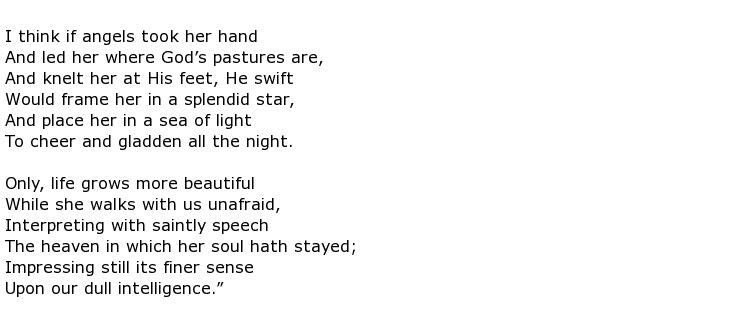Here is something I found online about the origins of the Holiday"
All Saints' Day
It is believed by many scholars that the commemoration of all the saints on November 1st originated in Ireland, spread from there to England, and then to the European continent. That it had reached Rome and had been adopted there early in the ninth century is attested by a letter of Pope Gregory IV, who reigned from 828 to 844, to Emperor Louis "the Pious," urging that such a festival be observed throughout the Holy Roman Empire.All Saints' Day
This does not surprise me--it is another example of Christian religion taking over and altering a Celtic Feast Samhain was one of the Major Harvest festivals of Celtic society and was a time when one could hope to communicated with the deceased loved ones ALL SOULS DAY.
I know-- I know many people say-- My mother was a saint--but mine really was. But I won't argue the point.
No, besides the statue of Saint Raphael that stands in front of the school of that name on Walcott Street, what people have I met in Pawtucket who I believe are saints in heaven?
I always mention Modesto Lunadelli and John White because of their stalwart support of our family in time of need. So I have evidence of their works, but I really knew little of their faith.
Ed Hogan and Jenarita Fox impressed me both because of their professional dedication to teaching and improving the lives of Special Needs children.We now take events like the Special Olympics for granted but they did not exist in the 40s and 50s when my sisters were growing up. There were not even special ed classes until Jenarita Fox started one at Grove Street School.
Ed Hogan created many activities for handicapped children at the CYO in Pawtucket.
Certainly as a child I met at least one saint teaching school at Saint Joseph's in Pawtucket. My Eighth grade homeroom teacher Sister Mary Michaeleen qualifies. She was a cheerful, playful happy sister and I think those are traits of a saint like Saint Francis.
I loved her simplicity and her kindness. I never saw her say anything unkind or diminish a student in any way. She also endeared herself to us because she shared real human things and she was a great teacher because she was passionate about her subject LATIN especially the The Aeneid the great epic poem by Virgil.
She was so thrilled because her brother was studying to be a priest. AND one day he came outside our classroom and she went out to greet him. Her face was beaming with a happiness that combined an essential shyness with an immense pride in his accomplishment. She explained to us that he had just been ordained and that he had come at her request to give us his blessing.
She said that the blessing of a newly ordained priest was very powerful. That it erased all sin and would help us to reach salvation. We all stood and then fell to our knees. I was immensely moved by the event. He blessed us in a solemn manner turning three times so that we were all included in his gaze. That feeling of certainty that I was saved and the jubilation as that grace arose in me has never left.
I did reach a shared answer to this question unexpectedly.
Professor Al Mc Aloon was a friend in my childhood when he visited with his wife in the neighborhood. Later in life when I taught at Bryant College, I was pleased to re-make his acquaintance. He was a teacher of psychology and was a fervent Jungian. He was also an active leader in the Irish organizations and was committed to Irish freedom. So we shared many things.
When he was old and retired and I was way off teaching in Cincinnati, we would renew our friendship when I came back to Pawtucket every summer to see my mother, sister and aunts.
One blistering hot day we had arranged to meet for lunch at the Newport Creamery in Newport where Al lived. I had some trouble with traffic on the bridge and so I was late. When I arrived Al was waiting standing out side and he was pale and looked sick. We went inside to the AC and I chided him for standing out in the heat. When we were seated, he suddenly keeled over in a dead faint. I called the waiters and they called 911. The responders came fast and placed Al on a gurney. I rode with him to the hospital in Newport. I told them I was his cousin--I am sure we are cousins if you go back far enough. Anyway Al remained unconscious and his vitals were poor.
We were taken into a small cubicle in the Emergency area. Again I was asked about our relationship and I said COUSIN.
I was holding Al's hand and trying to rouse him with gossip and stories about Ireland. Suddenly the hand squeezed back and he said in a hoarse whisper THANK YOU, COUSIN
I laughed and I saw that he might slip back into that deep sleep again. SO I asked him a question to keep his brain working.
AL in your life have you ever met a person that you think is a saint?
He named a few names and dismissed each. I did the same. Then suddenly almost in unison we said one name
FATHER HENRY SHELTON
a man who devoted his life to helping the poor. That is my answer and I'm sticking to it.

